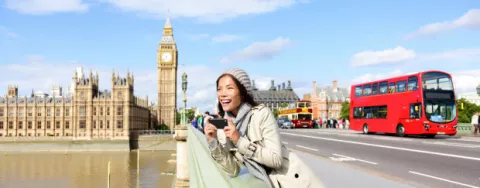
In a day where business people can meet with nearly anyone, anywhere in the world, over the Internet, you might think that tourism is a bad investment. But Council Lead Partner MasterCard finds investing in tourism is actually one of the better investments cities can make.
MasterCard’s 2014 Global Destination Cities Index evaluated the world’s top 132 destination cities and found that over the past five years, spending by foreign travelers climbed at a rate that was nearly three times as fast as the overall world economy grew.
The number of international travelers visiting the top 20 destinations is more than 5% greater than it was last year. And the growth rate would have been even better if it wasn’t for a steep drop in travel to Thailand.
Big economic boost
London regained its spot at the very top of the index. International travelers are forecast to spend more than $19 billion in that city this year. That amounts to $2,378 per resident.
London is not alone. The vast majority of the cities in the top 20 are forecast to receive at least $1,000 in tourist spending per resident this year, and some, including Dubai, Singapore and Barcelona, will receive between double and triple that.
Make it easy for travelers
Being in a place where travelers need and want to go certainly helps, but the cities that get the biggest slices of the tourism pie also make it easy for travelers to spend money.
Consider London, which provides a host of smartphone apps to help travelers find their way around the city, book cabs and bicycles, and take part in cultural activities and events. A tourism website guides travelers to download the most useful apps before they leave home and free Wi-Fi hotspots throughout the city let travelers use the apps without racking up roaming charges.
London’s variety of apps builds on the foundation it developed in advance of its Summer Olympics when it invited hackers to dream up solutions to issues travelers were likely to have.
Singapore has introduced a special feature to make it easy for travelers to use its app. For just $15, travelers can buy a special SIM card that provides them with access to the app’s contents without incurring international data charges or having to find a Wi-Fi hotspot. The card also provides discounts and other exclusive benefits at selected merchants.
It’s more than just apps
But apps are just one part of the equation. Cities that are smartest about tourism also tend to be cities that have fully embraced the concept of what it means to be a smart city. A poster child of this effort is Barcelona, which has been making smart city improvements for residents and travelers alike.
Barcelona recently overhauled the routes for its bus system to make it much easier for travelers to get where they need to go. With the new routes, 95% of the time travelers can get between any two points directly or with just one transfer. Interactive bus shelters also provide travelers with information on when their bus will arrive, and give them USB ports to charge their mobile devices.
The city also has 6,000 bicycles available to travelers in 400 locations throughout the city. Travelers can check on availability of bikes through a smartphone app. For those who need to travel by car, another app shows the real-time availability of parking spaces.
Between the ease of travel and availability of accommodations and meeting space, Barcelona was selected in 2011 to host the Mobile World Congress trade show through 2018. Barcelona beat 29 other cities for that honor. Last year, more than 70,000 people attended the show, creating 7,000 temporary jobs in the city.
More on smart tourism…
4 creative ways cities are using smart technologies to promote tourism
Case study: Egyptian world heritage site launches mobile portal to revitalize tourism



